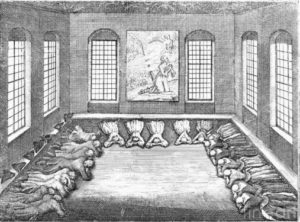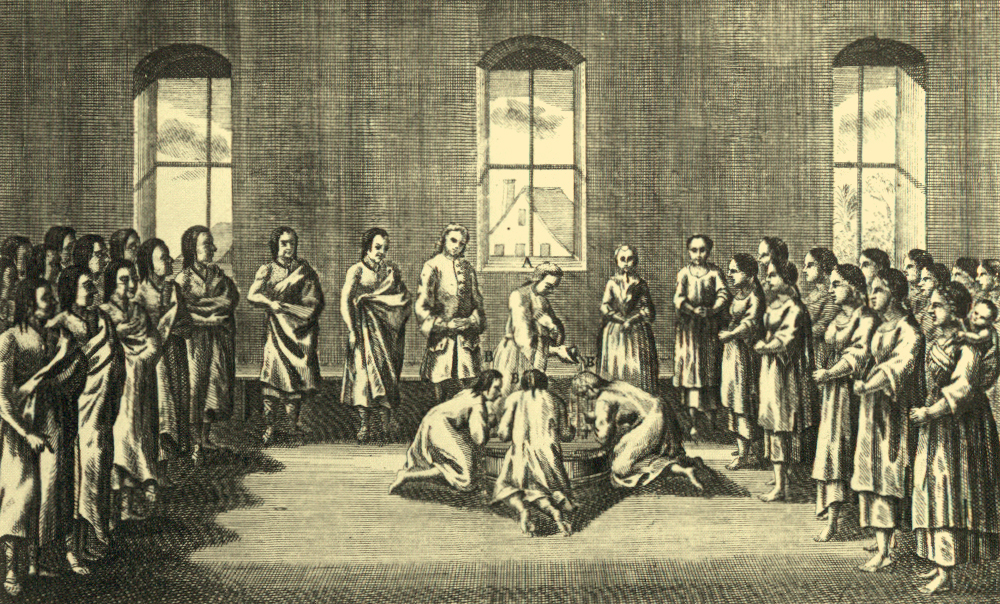The Moravians and Prayer

We are looking at the life of the Moravians, group of ordinary, messy believers who lived in Germany in the 18th century, but God used to transform the world through their radical life of discipleship. Last time, we saw how repentance changed their community from a place of division to one of peace and unity. Today we’ll see the place of prayer in their lives.
While Ludwig Zinzendorf, the Moravian leader, knew that Christian’s should pray, in the midst of the challenges of a divided community, fighting over doctrine, culture and traditions, he gained a revelation:
“Why not turn from facing issues and one another, to face Jesus Christ? Will he not save us from confusion?” Historian Peter Hoover notes:
Timidly at first, but with ever growing conviction, Ludwig and his friends stopped discussing religion to focus on Christ. To behold him, smitten in their hearts, worshipping him with indescribable silence and joy, they began to comprehend him as the Healing One, the Saviour—not only of individuals, but of Church and society, the Lamb of God that takes away the sins of the world.”
If Christ was the one who brought them together, then he was the place of healing rather than seeking to fix all of their divisions by themselves. It was out of this conviction, that 24 men and 24 women whose average age was 30 started a 24-hour prayer vigil. Each of them would select their prayer hour by lots and just as in the incense in the Jewish temple, they would seek to keep the fire of prayer burning day and night. This prayer meeting lasted for 100 years. But unlike many prayer meetings today, it was not merely a dutiful ritual, but a disciplined way to pursue a living relationship with Jesus.
Zinzendorf later explained:
Our aim is for everyone to keep up a close conversation with the Saviour. And I am concerned for nothing else but that this would be the case with all of us—that it becomes as natural for us to speak with Christ about anything, great or small, as it is to speak with a brother… There must be no possibility that anyone should see us in the morning, or that the light and air should greet us before we have been in conversation with the Lamb. Before any of that takes place, we must be able to say, “He and I have talked a good while together.”
Out of this rhythm of prayer, the Moravians felt God call them out on mission to take the gospel to the ends of the earth. Over the next 30 years, they would have planted multiple churches in 4 different continents.
What do we learn?
1) Prayer is relational not functional
Many of us are stressed, occupied, restless because our minds are filled with problem-solving – seeking to fix our world. It is easy then to see prayer as a last-resort, divine problem-solving tool. If I can’t fix it, may be God can. But the Moravians’ experience reveals they turned to prayer primarily as a chance to know their gracious Saviour relationally before it was a means to solve their own issues. Their 24hr prayer was not a way for them to feel spiritual or to twist God’s arm into blessing them, it was borne out of a deep sense of their need of Jesus. Did they still request material provision? Absolutely. That is an intrinsic part of a real relationship. But prayer is so much more than just getting asking for success in that job interview or for your kids health. It desires that Jesus would be known, loved and honoured in your life. It knows that apart from Jesus, we can do nothing of eternal value. His love, his kindness and his beauty are what we need more than anything else and that is what leads us to our knees.
2) Prayer requires discipline
Most believers know that we should prayer. Many of us feel guilty that we don’t pray. But guilt never improves our prayer life. The discipline and structure in the Moravian’s prayer was a secret to persevering over the long haul. While discipline can become mindless ritual, having no structured plan results in only self-focused, occasion-driven prayer. For many of us the latter is a greater problem than the former. If you struggle with prayer, make a plan to pray.
- Set a time. Morning is usually best.
- Choose a place. Your bed is likely to be a place of fervent snoring not fervent intercession. Choose somewhere which will be as conducive as possible to communing with God. If you have nowhere else, the bathroom will suffice!
- Decide how to pray. Needing to decide every single time what you will pray for and how to pray is a sure-fire way to drain your motivation to pray. Instead, use a pre-set Scripture plan or a book of the Bible (the Psalms are good to start with). Read a short passage and then pray in the light of it. Pray in confession, pray in praise and adoration of who God is, pray for yourself, for your family, for your CG, for Watermark, for your non-believing friends, for the city, for the world using the passage.
- Persevere.
3) A community of prayer encourages prayer
Finally, don’t pray in isolation. The Moravians prayed together and even when praying by themselves, they were doing so as a community knowing others were praying. So if you find discipline a struggle, don’t go it alone. Get together with 1 or 2 others and commit to prayer and Bible reading. Whatsapp each other your prayers. Talk about your prayer life together. Tell stories of God’s answers to prayer. Share how Jesus is becoming more precious to you. If we as a community are known as people who pray – not because we have to but because we get to through the gospel -that is where we begin to experience the presence of Jesus and He begins to lead us out on his mission together.

